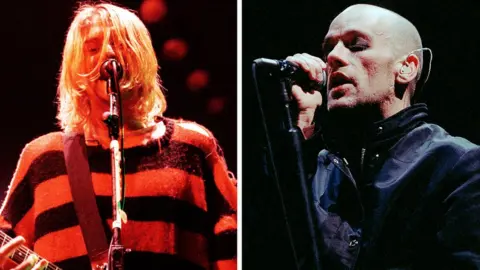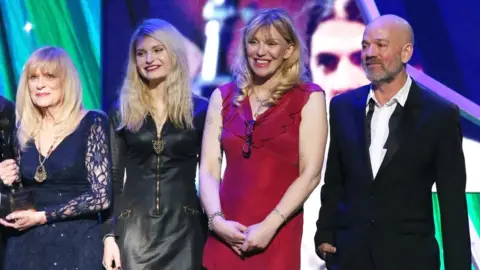Listen to a new, raw version of REM's 'elegy and eulogy' for Kurt Cobain
 Getty Images
Getty ImagesWhile REM were recording their ninth album, Monster, in 1994, Michael Stipe received a phone call he'd been dreading: Kurt Cobain was dead.
The pair had been close - Stipe was godfather to Cobain's daughter, Frances Bean - and the news hit him hard.
He poured his anguish into a song, Let Me In, one of the most chilling and painful moments in REM's catalogue.
As Monster turns 25, REM have remixed the song, which Stipe calls an "elegy and a eulogy", and created a new video.
Allow Google YouTube content?
Speaking to the BBC, the star said the song was written in one night and recorded the next day, with guitarist Mike Mills playing Cobain's sonic blue Fender, which had been presented to the band by the star's widow, Courtney Love.
"It was a devastating, catastrophic time for us, for everyone," Stipe said.
"But the song and the way it was recorded respond exactly to that moment, and what it felt like to have had someone that close to us, and who we admired as much as we admired Kurt, take his own life.
"It was horrible."
The original mix of Let Me In was viscerally angry, with Mills' thrashing guitar lines capturing the intensity of feeling in the studio. The new version brings Stipe's vocals forward (and erases a woozy organ line) revealing the sorrowful nuances of his performance, including a wordless falsetto that had been buried in the original mix.
It almost completely transforms the song, mirroring the way it evolved in concert - becoming quieter and more acoustic over the years. Stipe said those changes "absolutely" reflected the stages of his grieving process.
The video was created by animator Nir Ben Jacob, picking Stipe's lyrics out of a turbulent hurricane of typography. The singer called the clip "beautiful" and "stunning", adding: "It feels like Kurt, I have to say."
The revamped version of the song will be released on a 25th anniversary edition of Monster next month.
 Getty Images
Getty ImagesStipe befriended the Nirvana frontman in the early 1990s, acting as a mentor and sounding board as Nirvana followed a similar (albeit accelerated) career trajectory to REM - retaining their indie edge while making polished, cross-over rock music on a major label.
Cobain conspicuously praised REM in the press, telling Rolling Stone in 1994, "I know we're gonna put out one more record, at least, and I have a pretty good idea what it's going to sound like: pretty ethereal, acoustic, like Automatic For The People.
"If I could write just a couple of songs as good as what they've written… I don't know how that band does what they do. God, they're the greatest. They've dealt with their success like saints, and they keep delivering great music."
'We did everything we could'
In the months running up to Cobain's untimely death, Stipe had reached out to the star, hoping to engage him in a new musical venture.
"I put a project in front of him to try and pull him out of the headspace he was in," he told the BBC. "I knew he admired me and REM a lot and I came up with an idea for a project.
"I wrote him a letter, I sent him a plane ticket, I sent a car to his house to pick him up and bring him to the airport. We did everything we could to try to pull him out of the mental state he was in, but that level of anguish was untouchable."
Speaking on World Mental Health Day, Stipe said "understanding of mental health as an illness has advanced immensely," in the 25 years since Cobain's death.
"We're in a better place than we were 25 years ago in terms of mental health and understanding it. But there's still a lot of work to be done to help people who find themselves in those positions, or in a position of great depression."

Follow us on Facebook, or on Twitter @BBCNewsEnts. If you have a story suggestion email entertainment.news@bbc.co.uk.